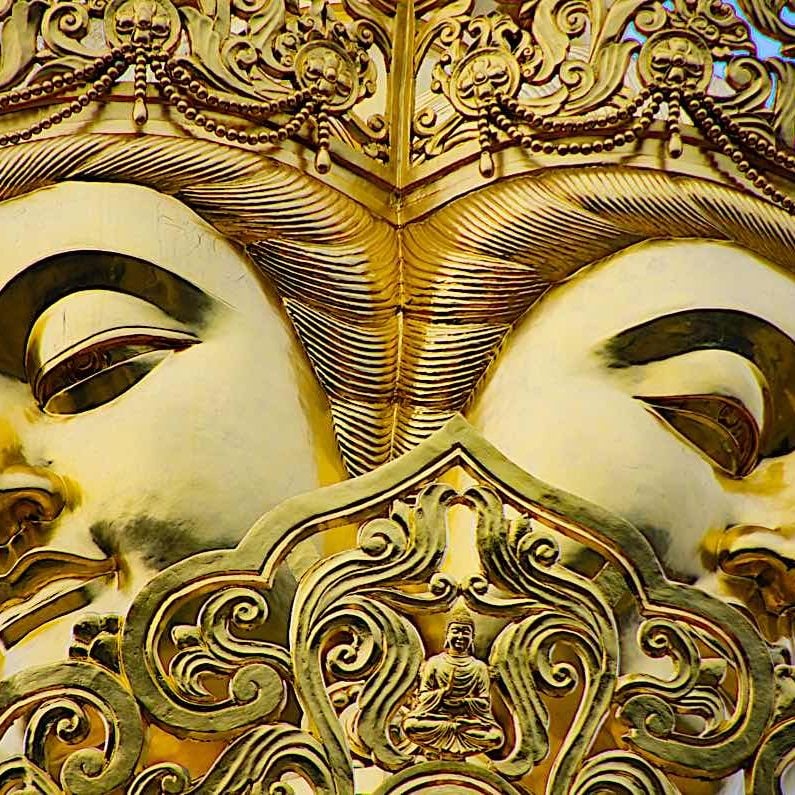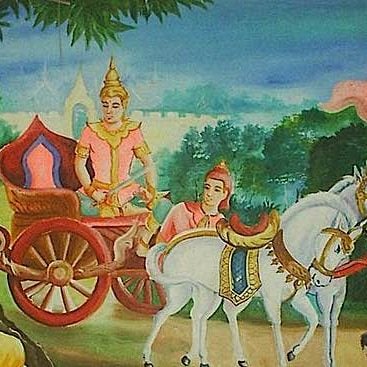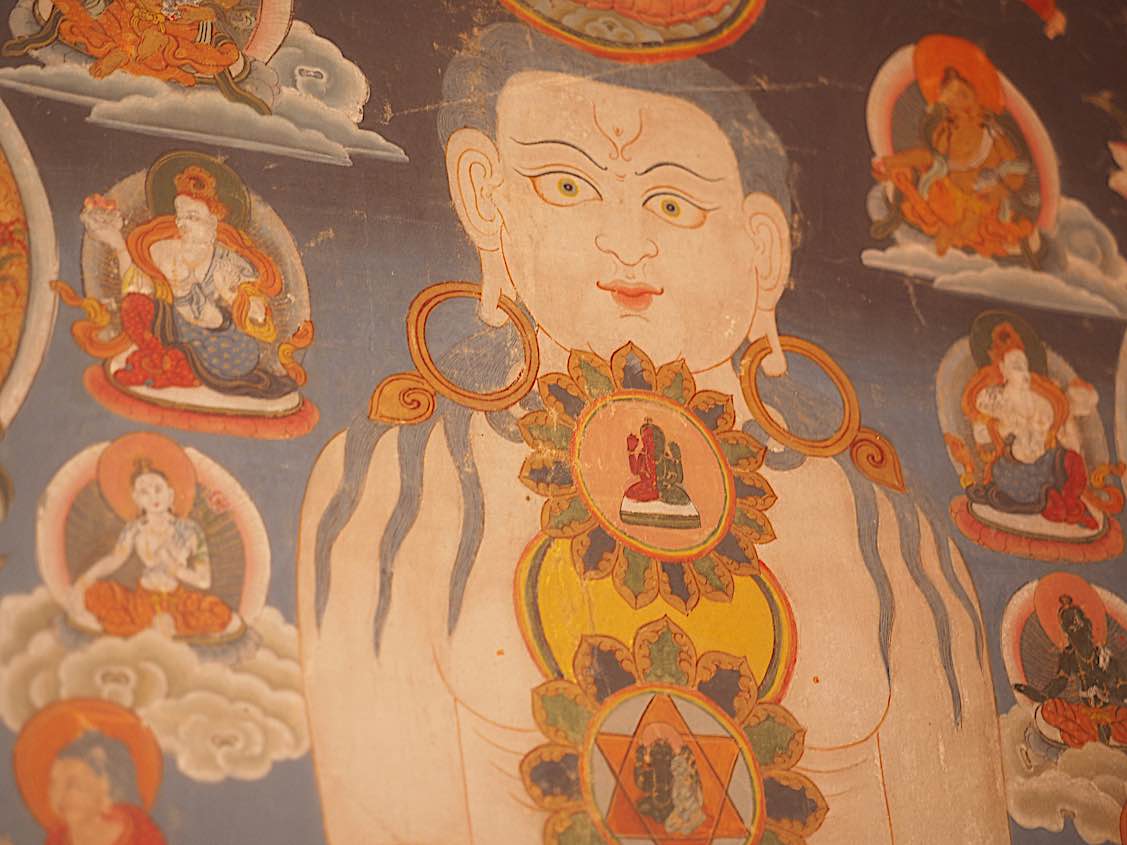Bhaddekaratta Sutta, Auspicious Day: “what is past is left behind; the future is as yet unreached… do what should be done today”
I have heard that on one occasion the Blessed One was staying in Savatthi, at Jeta’s Grove, Anathapindika’s monastery. There he addressed the monks: “Monks!”
“Yes, lord,” the monks responded.
The Blessed One said: “Monks, I will teach you the summary and exposition of one who has had an auspicious day. Listen and pay close attention. I will speak.”
“As you say, lord,” the monks replied.
The Blessed One said: “You shouldn’t chase after the past or place expectations on the future. What is past is left behind. The future is as yet unreached. Whatever quality is present you clearly see right there, right there. Not taken in,unshaken, that’s how you develop the heart. Ardently doing what should be done today, for — who knows? — tomorrow death. There is no bargaining with Mortality and his mighty horde.
Whoever lives thus ardently, relentlessly both day and night, has truly had an auspicious day: so says the Peaceful Sage.
“And how, monks, does one chase after the past? One gets carried away with the delight of ‘In the past I had such a form (body)’… ‘In the past I had such a feeling’… ‘In the past I had such a perception’… ‘In the past I had such a thought- fabrication”… ‘In the past I had such a consciousness.’ This is called chasing after the past.
“And how does one not chase after the past? One does not get carried away with the delight of ‘In the past I had such a form (body)’… ‘In the past I had such a feeling’… ‘In the past I had such a perception’… ‘In the past I had such a thought- fabrication”… ‘In the past I had such a consciousness.’ This is called not chasing after the past.
“And how does one place expectations on the future? One gets carried away with the delight of ‘In the future I might have such a form (body)’… ‘In the future I might have such a feeling’… ‘In the future I might have such a perception’… ‘In the future I might have such a thought-fabrication”… ‘In the future I might have such a consciousness.’ This is called placing expectations on the future.
“And how does one not place expectations on the future? One does not get carried away with the delight of ‘In the future I might have such a form (body)’… ‘In the future I might have such a feeling’… ‘In the future I might have such a perception’… ‘In the future I might have such a thought-fabrication”… ‘In the future I might have such a consciousness.’ This is called not placing expectations on the future.
“And how is one taken in with regard to present qualities? There is the case where an uninstructed run-of-the-mill person who has not seen the noble ones, is not versed in the teachings of the noble ones, is not trained in the teachings of the noble ones, sees form as self, or self as possessing form, or form as in self, or self as in form.
“He/she sees feeling as self, or self as possessing feeling, or feeling as in self, or self as in feeling.
“He/she sees perception as self, or self as possessing perception, or perception as in self, or self as in perception.
“He/she sees thought-fabrications as self, or self as possessing thought-fabrications, or thought-fabrications as in self, or self as in thought-fabrications.
“He/she sees consciousness as self, or self as possessing consciousness, or consciousness as in self, or self as in consciousness. This is called being taken in with regard to present qualities.
“And how is one not taken in with regard to present qualities? There is the case where a disciple of the noble ones who has seen the noble ones, is versed in the teachings of the noble ones, is well-trained in the teachings of the noble ones, does not see form as self, or self as possessing form, or form as in self, or self as in form.
“He/she does not see feeling as self, or self as possessing feeling, or feeling as in self, or self as in feeling.
“He/she does not see perception as self, or self as possessing perception, or perception as in self, or self as in perception.
“He/she does not see thought-fabrications as self, or self as possessing thought-fabrications, or thought-fabrications as in self, or self as in thought-fabrications.
“He/she does not see consciousness as self, or self as possessing consciousness, or consciousness as in self, or self as in consciousness. This
You shouldn’t chase after the past or place expectations on the future. What is past is left behind. The future is as yet unreached. Whatever quality is present you clearly see right there, right there. Not taken in, unshaken, that’s how you develop the heart. Ardently doing what should be done today, for — who knows? — tomorrow death. There is no bargaining with Mortality and his mighty horde. Whoever lives thus ardently, relentlessly both day and night, has truly had an auspicious day: so says the Peaceful Sage.
“‘Monks, I will teach you the summary & exposition of one who has had an auspicious day.’ Thus it was said, and in reference to this was it said.”
That is what the Blessed One said. Gratified, the monks delighted in the Blessed One’s words.
Bhaddekaratta Sutta
An Auspicious Day
Translated from the Pali by Thanissaro Bhikkhu.
More articles by this author

Protection from all Harm, Natural Disaster, Weather, Spirits, Evil, Ghosts, Demons, Obstacles: Golden Light Sutra: Chapter 14

Samantabhadra’s The King of Prayers is the ultimate Buddhist practice how-to and itself a complete practice

The Five Strengths and Powers or pañcabalā in Buddhism — the qualities conducive to Enlightenment: faith, energy, mindfulness, concentration and wisdom
Search
Latest Features
Please support the "Spread the Dharma" mission as one of our heroic Dharma Supporting Members, or with a one-time donation.
Please Help Support the “Spread the Dharma” Mission!

Be a part of the noble mission as a supporting member or a patron, or a volunteer contributor of content.
The power of Dharma to help sentient beings, in part, lies in ensuring access to Buddha’s precious Dharma — the mission of Buddha Weekly. We can’t do it without you!
A non-profit association since 2007, Buddha Weekly published many feature articles, videos, and, podcasts. Please consider supporting the mission to preserve and “Spread the Dharma." Your support as either a patron or a supporting member helps defray the high costs of producing quality Dharma content. Thank you! Learn more here, or become one of our super karma heroes on Patreon.
Lee Kane
Author | Buddha Weekly
Lee Kane is the editor of Buddha Weekly, since 2007. His main focuses as a writer are mindfulness techniques, meditation, Dharma and Sutra commentaries, Buddhist practices, international perspectives and traditions, Vajrayana, Mahayana, Zen. He also covers various events.
Lee also contributes as a writer to various other online magazines and blogs.















